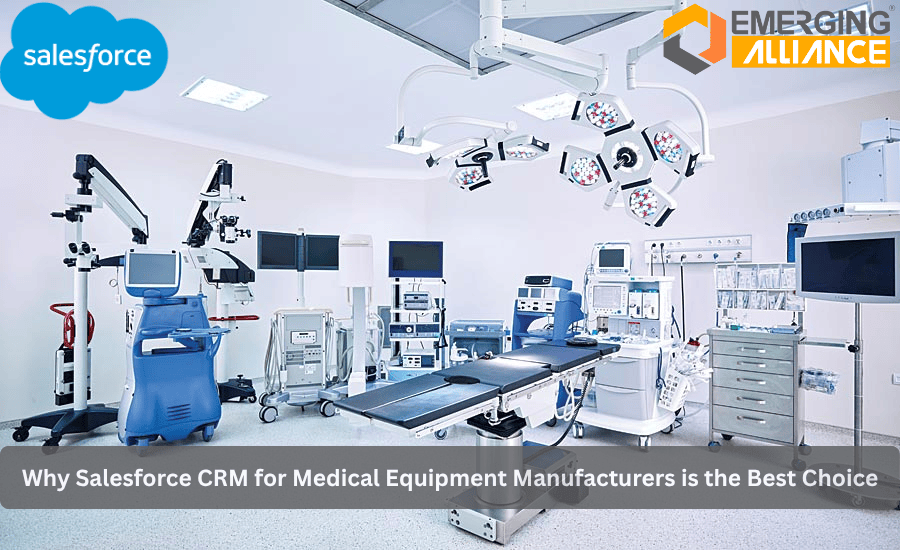
Salesforce CRM for Medical Equipment: Boost Sales & Compliance

Why Salesforce CRM for Medical Equipment Manufacturers is the Best Choice
In the modern healthcare industry, Medical equipment manufacturers face a highly competitive and regulated environment. From hospitals and clinics to research institutions, customers expect not only high-quality products but also exceptional service, compliance, and support. In this context, a robust Customer Relationship Management (CRM) system is no longer optional it is a strategic necessity. Among the available options, Salesforce CRM for medical equipment manufacturers stands out as the best-in-class solution, offering a comprehensive platform tailored specifically to the needs of the medical device and equipment sector.
Challenges Faced by Medical Equipment Manufacturers
Medical equipment manufacturers operate in a complex ecosystem, and their challenges differ significantly from traditional manufacturing sectors. Key challenges include:
- Complex and Lengthy Sales Cycles: Selling medical equipment typically involves multiple decision-makers, including hospital administrators, procurement teams, and clinical staff. Managing these interactions across months or even years requires precise tracking and follow-up mechanisms.
- Regulatory Compliance: Manufacturers must adhere to strict regulations such as FDA guidelines, ISO standards, and local healthcare compliance laws. Failure to comply can lead to fines, reputational damage, or even product recalls.
- Training and Support: Many medical devices require specialized training for healthcare professionals. Ensuring timely and consistent training while tracking post-sales support is critical to customer satisfaction and compliance.
- Cross-Department Coordination: Sales, marketing, service, inventory, and finance teams must operate in harmony. Disconnected systems can lead to errors, missed opportunities, and inefficiencies.
- Data Management Challenges: With multiple product lines, distributors, and customer types, managing and analyzing data effectively is essential for strategic decisions.
Without a unified CRM solution, these challenges can slow growth and impact profitability. Salesforce CRM for medical equipment manufacturers addresses these challenges with a purpose-built platform designed for the healthcare sector.
Key Benefits of Salesforce CRM for Medical Equipment Manufacturers
1. Centralized Customer and Account Management
A core feature of Salesforce CRM is its ability to centralize customer and account information. Manufacturers can store detailed profiles, purchase histories, service records, and communication logs all in one platform. This 360-degree view of customers enables sales teams to understand client needs, anticipate purchase patterns, and foster stronger relationships. For example, a sales representative can access the full history of equipment purchased by a hospital, upcoming maintenance schedules, and past support tickets in one place allowing for more personalized interactions.
2. Streamlined Medical Equipment Sales Management
Salesforce CRM optimizes medical equipment sales management by providing tools to track leads, opportunities, and deals at every stage of the sales pipeline. Features like automated follow-ups, reminders, and real-time sales dashboards ensure that no opportunity is overlooked. Additionally, Salesforce allows for territory and distributor management, helping manufacturers monitor regional performance and allocate resources efficiently. The result is increased sales effectiveness, faster deal closures, and improved revenue forecasting.
3. Compliance and Regulatory Management
Compliance is a non-negotiable aspect of medical device manufacturing. Salesforce CRM helps companies maintain accurate records of certifications, approvals, and audit trails. With customizable modules, manufacturers can track device training for healthcare providers, document safety checks, and ensure all marketing communications adhere to regulations. This level of organization minimizes compliance risks and strengthens the company’s credibility in the market.
4. Advanced Analytics and Reporting
In today’s data-driven world, analytics is key to business success. Salesforce CRM provides real-time insights into sales performance, product adoption, customer behavior, and marketing effectiveness. Manufacturers can generate customizable reports and dashboards that reveal trends, highlight high-performing products, and identify areas for improvement. For instance, a company may discover that a particular line of diagnostic equipment performs better in certain regions, allowing targeted marketing and sales strategies.
5. Integration with Healthcare Systems
Modern medical equipment companies often rely on multiple software systems, including ERP, Hospital Information Systems (HIS), and Electronic Health Records (EHR). Salesforce CRM offers seamless integration with these systems, ensuring data flows smoothly across departments. This integration reduces manual work, eliminates errors, and provides a unified view of business operations, helping manufacturers make informed decisions faster.
6. Improved Customer Support and Service
For medical device manufacturers, providing exceptional customer service is critical. Salesforce Service Cloud allows companies to manage service requests, maintenance schedules, and support tickets efficiently. Automated workflows ensure cases are assigned to the right technician, and real-time updates keep healthcare providers informed. This proactive approach enhances customer satisfaction, reduces downtime, and builds long-term loyalty.
7. Customizable for Unique Business Needs
Every medical equipment manufacturer has distinct operational requirements. Salesforce CRM is highly customizable, allowing companies to create workflows, dashboards, and modules tailored to their processes. Whether managing clinical trials, tracking maintenance schedules, or ensuring multi-country regulatory compliance, Salesforce adapts to the manufacturer’s specific needs.
8. Marketing Automation for Medical Devices
Marketing medical equipment requires precision and compliance. Salesforce Marketing Cloud helps manufacturers automate email campaigns, manage events, segment audiences, and track engagement all while adhering to strict healthcare advertising regulations. This ensures campaigns are effective, compliant, and targeted to the right stakeholders, generating higher-quality leads.
9. Mobile Accessibility for Field Sales Teams
Medical equipment sales representatives are frequently on the move. Salesforce CRM’s mobile application allows field teams to access customer data, update service calls, and log sales activity in real-time. Mobile access ensures productivity in the field, reduces data entry errors, and provides sales managers with real-time visibility into team performance
10. Enhanced Collaboration Across Teams
Salesforce enables seamless collaboration between sales, marketing, service, and finance teams. Shared dashboards, automated notifications, and real-time data updates reduce silos and ensure everyone has access to the same information. This fosters teamwork, speeds decision-making, and improves overall operational efficiency.
Real-World Impact
Many medical equipment manufacturers have experienced measurable improvements after implementing Salesforce CRM for medical equipment manufacturers. Reported benefits include:
- 30–40% increase in lead conversion rates due to better pipeline management
- Significant reduction in administrative overhead through automation
- Improved regulatory compliance tracking with integrated documentation
- Enhanced customer satisfaction through timely support and proactive engagement
These results demonstrate that Salesforce CRM is not just a software tool it is a strategic driver of business growth and operational excellence.
Medical equipment manufacturers operate in a highly demanding industry where precision, compliance, and customer service define success. Salesforce CRM for Medical Equipment Manufacturers provides a comprehensive, scalable, and fully customizable solution designed to address the unique challenges of this sector. By streamlining sales, marketing, service, and compliance management, Salesforce empowers manufacturers to make data-driven decisions, improve operational efficiency, and strengthen relationships with healthcare providers.
For medical equipment companies aiming to stay ahead of the competition, boost revenue, and deliver exceptional customer experiences, Salesforce CRM is the most effective and future-ready choice.
Partnering with Emerging Alliance, an experienced Salesforce consulting and implementation partner, ensures you unlock the full potential of Salesforce tailored to your business needs. With deep industry expertise and a proven track record, Emerging Alliance helps medical device manufacturers seamlessly adopt, customize, and scale Salesforce CRM — driving innovation, compliance, and sustainable growth in a rapidly evolving market.
Top FAQs on Salesforce CRM for Medical Device Manufacturers
1. How long does a typical Salesforce implementation take for a medical equipment manufacturer?
Answer: Implementation times vary by scope, but a focused rollout (core sales + service + compliance tracking) typically takes 8–16 weeks. Phased approaches (pilot → scale) reduce risk and deliver quick wins.
2. How does Salesforce help streamline medical equipment sales?
Answer: Salesforce CRM provides tools for managing long sales cycles, tracking leads and opportunities, forecasting revenue, and automating follow-ups. By giving sales teams a 360-degree view of customers, it ensures timely engagement and higher conversion rates.
3. Can Salesforce CRM ensure regulatory compliance?
Answer: Yes. Salesforce allows manufacturers to track certifications, approvals, training records, and audit trails. It also helps ensure marketing and sales communications comply with FDA, ISO, and local regulations, reducing compliance risks.
4. How does Salesforce improve post-sales support for medical devices?
Answer: Salesforce Service Cloud enables manufacturers to track service requests, maintenance schedules, and support tickets. Automated workflows assign cases to the right technician and provide real-time updates to customers, improving response times and satisfaction.
5. Can Salesforce integrate with other healthcare systems?
Answer: Absolutely. Salesforce CRM can integrate with ERP systems, Hospital Information Systems (HIS), Electronic Health Records (EHR), and inventory management software. This ensures seamless data flow across departments, reducing errors and improving operational efficiency.
6. Is Salesforce customizable for unique medical device requirements?
Answer: Yes. Salesforce is highly flexible and can be tailored to specific business processes, such as managing clinical trials, tracking maintenance schedules, multi-country compliance, or specialized reporting needs.
7. How does Salesforce help with marketing medical equipment?
Answer: Salesforce Marketing Cloud allows manufacturers to automate campaigns, segment audiences based on specialty or purchase behavior, manage events, and track engagement. This ensures targeted, compliant, and effective marketing strategies.
8. Can field sales teams use Salesforce on the go?
Answer: Yes. Salesforce has a mobile app that allows sales representatives to access customer information, update visits, and log activities in real-time. This improves productivity and ensures accurate data capture while on the field.
9. What analytics and reporting features does Salesforce offer for medical equipment manufacturers?
Answer: Salesforce provides real-time dashboards and customizable reports to track sales performance, customer engagement, product adoption, and service metrics. These insights help manufacturers make data-driven decisions and optimize operations.
10. Why is Salesforce considered the best CRM for medical device manufacturers?
Answer: Salesforce combines advanced sales management, service, marketing, analytics, and compliance features in a single platform. Its industry-specific customization, seamless integration, and mobile capabilities make it the most effective CRM solution for medical equipment manufacturers.



